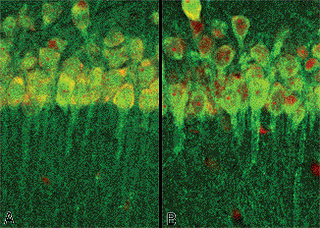Ubiquitin-Catolog#:19005

Image: ABC-HRP staining with Ubiquitin monoclonal antibody (diluted 1:1,000) of Alzheimer’s disease cerebral cortex showing dystrophic neuritis, which contain ubiquitinated tau. The inclusions are detected by the Ubiquitin antibody. Normal cortex does not contain inclusions and would be white in color.
Ubiquitin-Catalog#: MO18001

Confocal images of hippocampal CA1 sections from rats, (A) mock-treated or (B) subjected to 15 minutes ischemia followed by 24 hours of reperfusion, using ubiquitin mouse antibody (green) and propidium iodide (red). Data courtesy of Cell Signaling Technology, Inc.




2 comments:
I saw you mentioned ubiquitin so I thought you might be interested in Science Magazine's current webinar:
The Ubiquitin-Proteasome Pathway
Hello Dude,
Ubiquitin is a highly conserved 76 amino acid protein which is covalently coupled to proteins targeted for degradation by the proteasome, a normal physiologic process. In some cases, including those associated with pathological conditions, ubiquitin accumulation has been observed. This phenomenon has been seen in Alzheimer’s and Parkinson’s disease progression. Thanks a lot!
Ubiquitin Antibody
Post a Comment